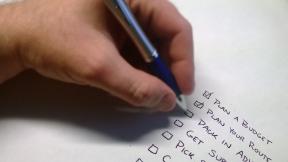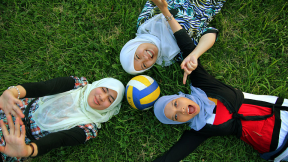
While we may try conducting ourselves Islamically during a convention, all of us slip up somewhere. How can we ensure a safe and productive environment for ourselves and others at conferences? How can we not just practice etiquette ourselves but encourage others to do the same?. Below is a four-step guide.
Step 1: Start with ourselves
We can't tell someone to be quiet during a lecture and then turn back and whisper to our neighbor sitting beside us. That means we've got to know the etiquette and practice it.
If the bathroom counter is covered in water post-mass Wudu, wipe it up, even if it isn't your mess. If this doesn't set an example, it will at least make others realize they should clean up after themselves and not expect others to do it for them.
Step 2: Encourage your children to do the same
For some children, conventions are scary, unknown places with plenty of strangers. For others, it's a playground where they'll meet other kids.
When it comes to your children, enjoining the good and forbidding the evil has to come before the conference, and then it needs to be reinforced there.
That means sitting down with them and explaining where you are going and why. You need to explain that a conference is a place to learn and practice good Islamic manners.
Once you reach the convention, never leave the kids unattended. Each child should be supervised by at least one parent or trusted family member. Kids can only learn Islamic etiquette when they see mom giving up a space in the elevator for an elderly or wheelchair-bound Muslim. They can only learn to walk on the side of the big hallways during heavy traffic when the see dad sticking to his side and lowering his gaze while the women pass by.
As well, if kids do misbehave on occasion, this should be dealt with gently and privately. Public displays of discipline will only hurt and humiliate them in front of others.
Step 3: Encourage our parents and siblings
If you don't have kids, encouraging parents and siblings to practice Islamic etiquette is still important. Having a family meeting to discuss things like logistics, proper gender interaction, who will be in charge while traveling etc. will help reduce conflict and be a good opportunity to talk about proper behavior.
If you do notice inappropriate behavior at the conference, this has to be addressed in private in a gentle manner. It cannot be done through public humiliation, which will lead to bitterness and spoiling the trip for the whole family.
Step 4: Encourage strangers
This one is tough. How can we enjoin the good and forbid the evil with Muslims we have never met before without judging and hurting feelings?
First, we should make excuses for a brother or sister whose behavior is not in line with Islamic guidelines or is disrupting others. Assume they don't know. Maybe they are new Muslims and this is their first conference. The last thing we would want to do is scare them away with harshness. Or maybe the person has just started to become a more practicing Muslim and is attending his or her first conference.
Second, if excuses ahve been made, it will be easier to be sympathetic and kind to someone who may be doing something incorrect.
Third, the criticism should be done privately, not in front of others. One of the worst things we can do is turn a Muslim away from Islamic events by harsh behavior.
Here's one way to handle a common situation: someone talking in the middle of a session. Instead of serving up dirty looks or harsh words, try two things.
First, write a note to the moderator asking him or her to remind the audience to remain silent during session.
If this is not possible, you can write a short note yourself, but avoid distracting others when passing it to the person(s) who is talking. It could read as follows:
Dear Brother/Sister:
Assalamu alaykum. My name is Sr/Br. (your name). I've come all the way from (your city or state or country) to this conference to learn from the speakers. But I cannot concentrate on the lecture right now. Can I ask you to please talk to your neighbor after the lecture? I would really appreciate your cooperation. Jazak Allah. May Allah bless you.








Comments
Thank you for this excellent article! There is much wisdom here, found in a few small, easily-digested steps. The idea of "enjoining the good" by setting the example is so obvious, yet so often overlooked - often far superior to, and more effective than, a lecture. Assuming that people who make mistakes simply "don't know" fills our hearts with love, respect, and understanding rather than harsh and unforgiving judgment. "Forbidding the evil" with gentle and private explanation - avoiding public displays of criticism and the hurt, humiliation, and bitterness they create - is pure brilliance.When we ourselves make a mistake, we'd like to be given the benefit of the doubt and privately and respectfully guided to better behaviour. So this article is simply showing us how to "do unto others as we'd have them do unto us."Though it all seems so obvious, this gentle reminder is much needed. Thank you!
Location
Add new comment